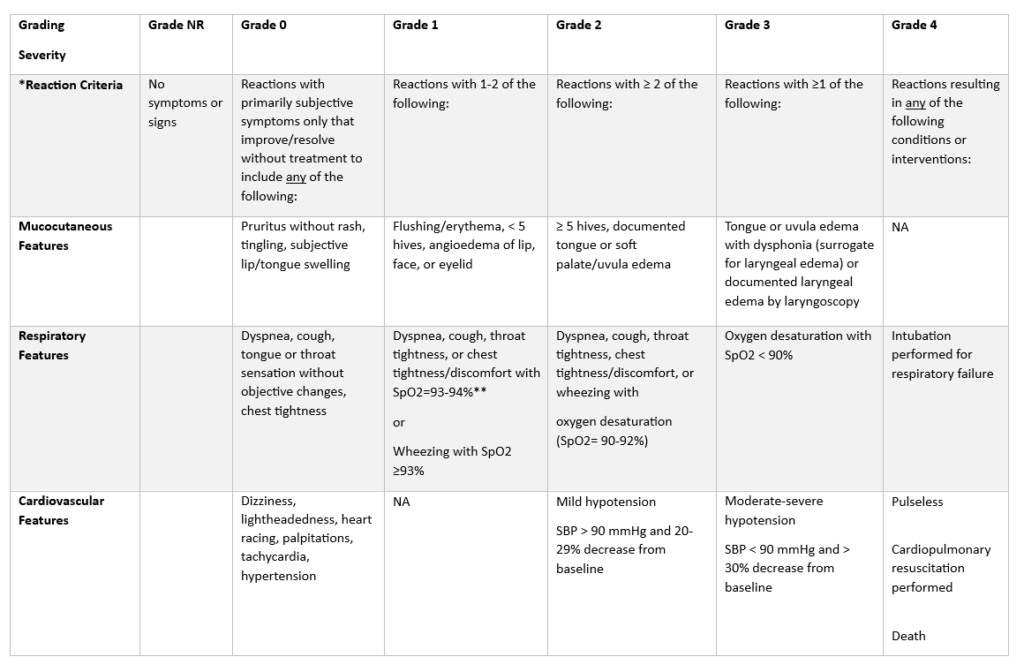David A Khan MD, 1, Elizabeth J Phillips MD, 2, John J Accarino MD, 3, Alexei Gonzalez-Estrada MD, 4, Iris M Otani MD, 5, Allison Ramsey MD, 6, Anna Chen Arroyo MD, MPH, 7, Aleena Banerji MD, 3, Timothy Chow MD, 8, Anne Y Liu MD, 9, Cosby A Stone Jr MD, MPH, 10, Kimberly G Blumenthal MD, Msc, 11
Date Published
December 2023
Affiliations
- Department of Internal Medicine, Division of Allergy and Immunology, University of Texas Southwestern Medical Center, Dallas, Tex.
- Center for Drug Safety and Immunology, Vanderbilt University Medical Center, Nashville, Tenn; Division of Allergy, Pulmonary and Critical Care Medicine, Department of Medicine, Vanderbilt University School of Medicine, Nashville, Tenn.
- Department of Medicine, Division of Rheumatology, Allergy and Immunology, Boston, Mass; Harvard Medical School, Boston, Mass.
- Division of Allergy, Asthma, and Clinical Immunology, Department of Medicine, Mayo Clinic, Phoenix, Ariz.
- Division of Pulmonary, Critical Care, Allergy and Sleep Medicine, Department of Medicine, University of California San Francisco Medical Center, San Francisco, Calif.
- Rochester Regional Health, Rochester, NY; Department of Allergy/Immunology, University of Rochester School of Medicine and Dentistry, Rochester, NY.
- Division of Pulmonary, Allergy and Critical Care Medicine, Department of Medicine, Stanford University School of Medicine, Stanford, Calif.
- Department of Internal Medicine, Division of Allergy and Immunology, University of Texas Southwestern Medical Center, Dallas, Tex; Department of Pediatrics, Division of Allergy and Immunology, University of Texas Southwestern Medical Center, Dallas, Tex.
- Division of Pulmonary, Allergy and Critical Care Medicine, Department of Medicine, Stanford University School of Medicine, Stanford, Calif; Division of Infectious Disease, Department of Medicine, Stanford University School of Medicine, Stanford, Calif.
- Division of Allergy, Pulmonary and Critical Care Medicine, Department of Medicine, Vanderbilt University School of Medicine, Nashville, Tenn.
- Department of Medicine, Division of Rheumatology, Allergy and Immunology, Boston, Mass; Mongan Institute, Massachusetts General Hospital, Boston, Mass; Harvard Medical School, Boston, Mass. Electronic address: kblumenthal@mgh.harvard.edu.
Full Article
Abstract
There is no accepted grading system classifying the severity of immediate reactions to drugs.
The purpose of this article is to present a proposed grading system developed through the consensus of drug allergy experts from the United States Drug Allergy Registry (USDAR) Consortium patient characteristics and drug allergy concerns using multinomial logistic regression models.
The USDAR investigators sought to develop a consensus severity grading system for immediate drug reactions that is applicable to clinical care and research.
The USDAR grading scale scores severity levels on a scale of 0 to 4. A grade of no reaction (NR) is used for patients who undergo challenge without any symptoms or signs, and it would confirm a negative challenge result. A grade 0 reaction is indicative of primarily subjective complaints that are commonly seen with both historical drug reactions and during drug challenges, and it would suggest a low likelihood of a true drug allergic reaction. Grades 1 to 4 meet the criteria for a positive challenge result and may be considered indicative of a drug allergy. Grade 1 reactions are suggestive of a potential immediate drug reaction with mild symptoms. Grade 2 reactions are more likely to be immediate drug reactions of moderate severity. Grade 3 reactions have features suggestive of a severe allergic reaction, whereas grade 4 reactions are life-threatening reactions such as anaphylactic shock and fatal anaphylaxis.
This proposed grading schema for immediate drug reactions improves on prior schemata by being developed specifically for immediate drug reactions and being easy to implement in clinical and research practice.
Table – USDAR grading scale for immediate drug reactions


